Unit 6 Detectives Lesson 16 A Detective Story (I) 2 课件(共44张PPT)
文档属性
| 名称 | Unit 6 Detectives Lesson 16 A Detective Story (I) 2 课件(共44张PPT) |  | |
| 格式 | zip | ||
| 文件大小 | 2.8MB | ||
| 资源类型 | 教案 | ||
| 版本资源 | 北师大版 | ||
| 科目 | 英语 | ||
| 更新时间 | 2020-06-21 09:11:45 | ||
图片预览

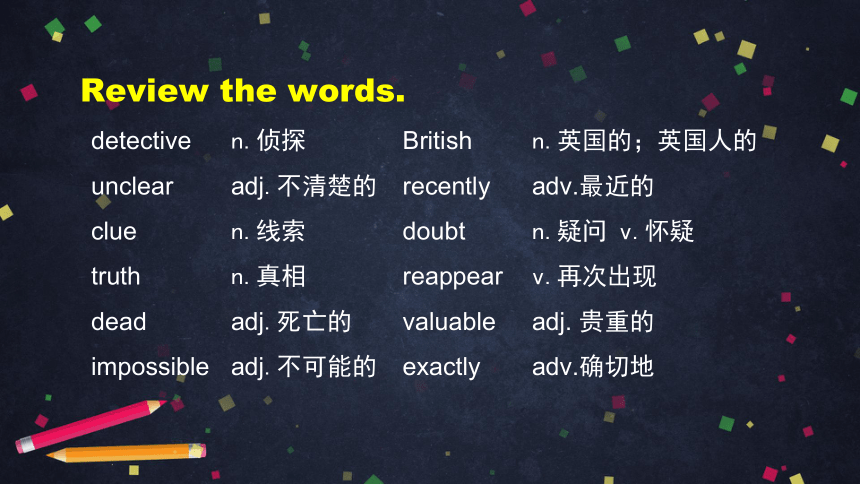

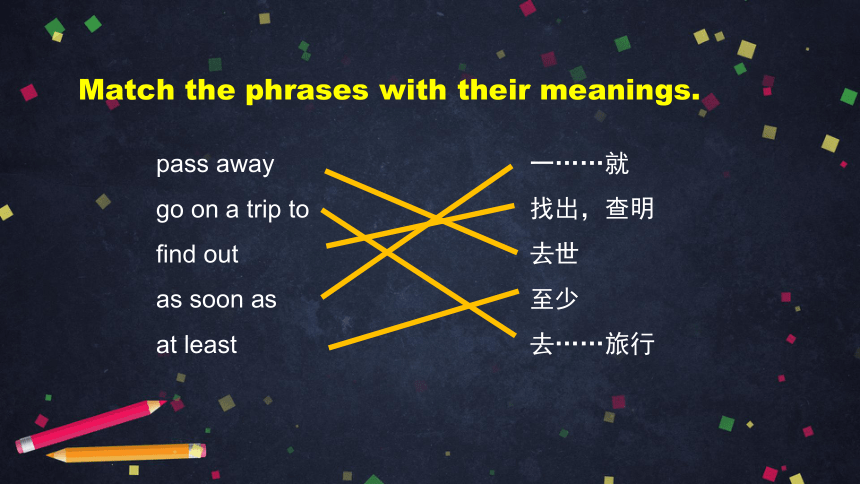
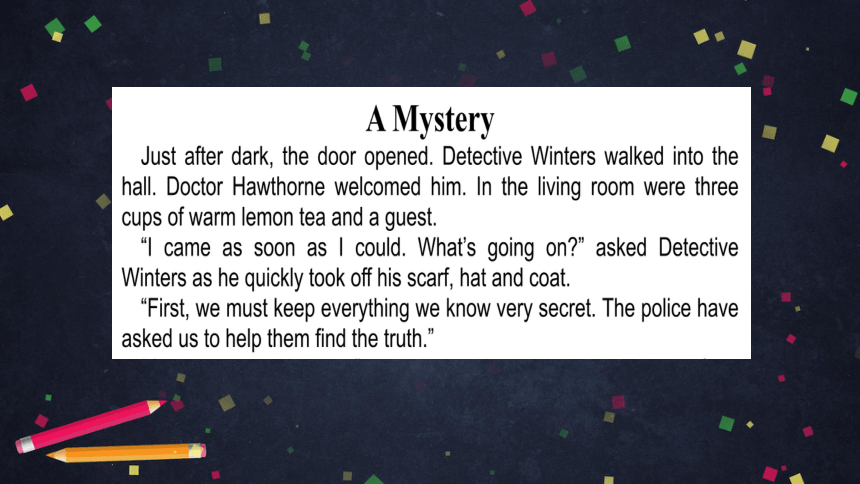
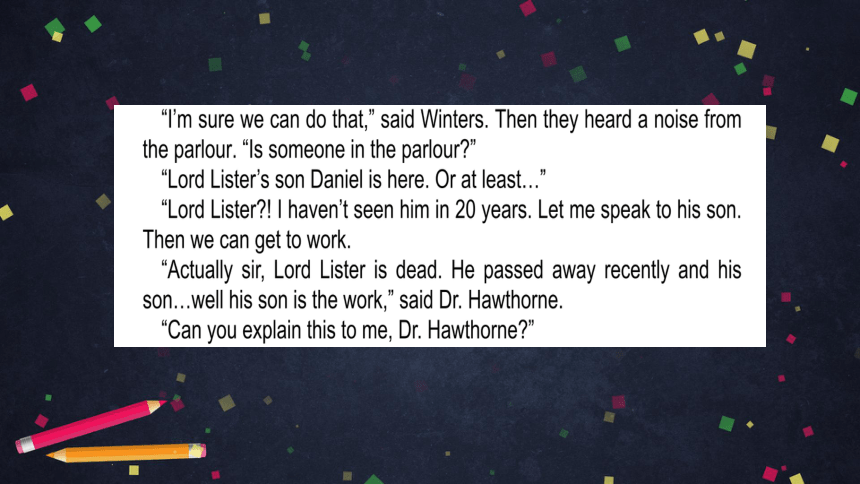
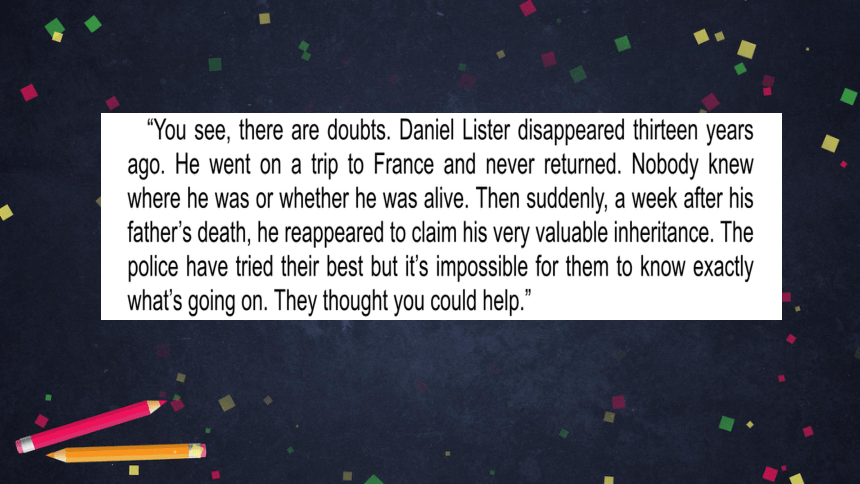


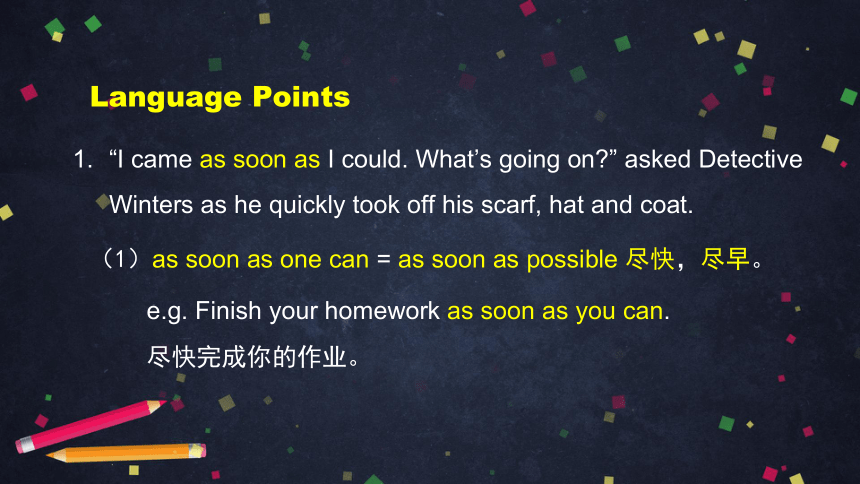
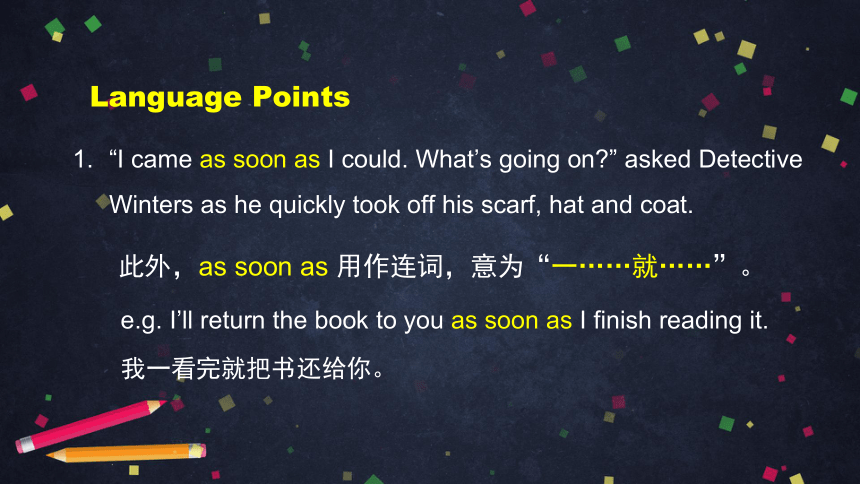
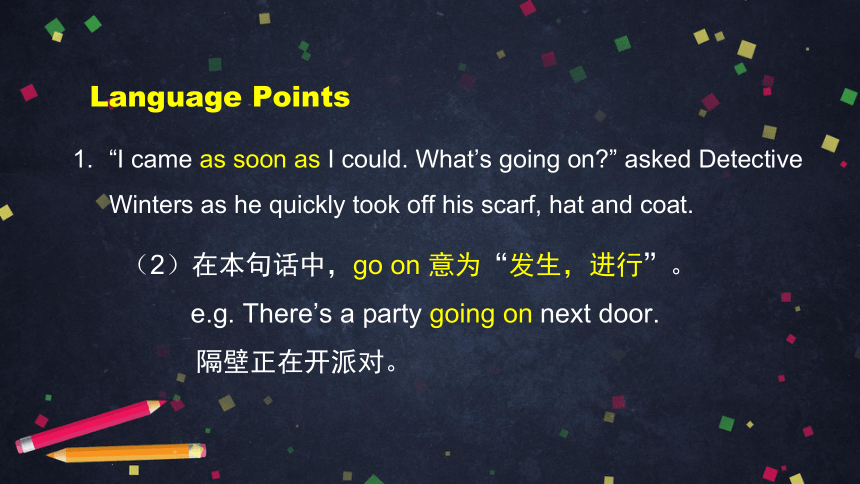
文档简介
(共44张PPT)
U6
Lesson16
A
Detective
Story
2
初二年级
英语
Review
the
words.
detective
unclear
clue
truth
dead
impossible
n.侦探
adj.不清楚的
n.线索
n.真相
adj.死亡的
adj.不可能的
British
recently
doubt
reappear
valuable
exactly
n.英国的;英国人的
adv.最近的
n.疑问
v.怀疑
v.再次出现
adj.
贵重的
adv.确切地
Match
the
words
with
their
meanings.
死亡的
线索
真相
再次出现
侦探
疑惑;怀疑
贵重的
doubt
reappear
valuable
detective
clue
truth
dead
Match
the
phrases
with
their
meanings.
一……就
找出,查明
去世
至少
去……旅行
pass
away
go
on
a
trip
to
find
out
as
soon
as
at
least
“I
came
as
soon
as
I
could.
What’s
going
on?”
asked
Detective
Winters
as
he
quickly
took
off
his
scarf,
hat
and
coat.
Language
Points
“我尽快赶来了,发生了什么事?”温斯特侦探一边问
一边迅速地摘掉围巾、帽子,脱去外套。
(1)as
soon
as
one
can
=
as
soon
as
possible
尽快,尽早。
Language
Points
尽快完成你的作业。
e.g.
Finish
your
homework
as
soon
as
you
can.
“I
came
as
soon
as
I
could.
What’s
going
on?”
asked
Detective
Winters
as
he
quickly
took
off
his
scarf,
hat
and
coat.
此外,as
soon
as
用作连词,意为“一……就……”。
Language
Points
我一看完就把书还给你。
e.g.
I’ll
return
the
book
to
you
as
soon
as
I
finish
reading
it.
“I
came
as
soon
as
I
could.
What’s
going
on?”
asked
Detective
Winters
as
he
quickly
took
off
his
scarf,
hat
and
coat.
(2)在本句话中,go
on
意为“发生,进行”。
e.g.
There’s
a
party
going
on
next
door.
隔壁正在开派对。
Language
Points
“I
came
as
soon
as
I
could.
What’s
going
on?”
asked
Detective
Winters
as
he
quickly
took
off
his
scarf,
hat
and
coat.
(3)take
off
脱掉,脱去。
e.g.
Don’t
take
off
your
raincoat.
You’ll
get
wet.
别把雨衣脱了,你会被淋湿的。
Language
Points
“I
came
as
soon
as
I
could.
What’s
going
on?”
asked
Detective
Winters
as
he
quickly
took
off
his
scarf,
hat
and
coat.
2.He
went
on
a
trip
to
France
and
never
returned.
他去法国旅行,再也没有回来过。
go
on
a
trip
去旅行。类似的用法还有:
go
on
a
picnic
去野餐
go
on
an
expedition
去探险
Language
Points
3.
Oh
my.
This
is
all
very
sad.
哎呀,这太让人难过了。
此处,my用作感叹词,表示惊讶。
意为“哎呀!哇!”。
Language
Points
1.
as
soon
as
one
can
2.
go
on
3.
take
off
4.
go
on
a
trip
5.
go
on
a
picnic
6.
go
on
an
expedition
Language
Points
尽快,尽早
发生,进行
脱掉,脱去
去旅行
去野餐
去探险
Detective
Winters
was
invited
to
Doctor
Hawthorne’s
home.
The
police
asked
them
for
help.
Find
what
questions
Detective
Winters
asked
from
the
story.
1.
“What’s
going
on?”
2.
“Is
someone
in
the
parlour?”
3.
“Can
you
explain
this
to
me,
Dr
Hawthorne?”
Direct
Questions
1.
“What’s
going
on?”
2.
“Is
someone
in
the
parlour?”
3.
“Can
you
explain
this
to
me,
Dr
Hawthorne?”
Detective
Winters
asked
what
was
going
on.
He
asked
if
someone
was
in
the
parlour.
He
asked
if
Doctor
Hawthorne
could
explain
the
situation
to
him.
1.Detective
Winters
asked
what
was
going
on.
2.He
asked
if
someone
was
in
the
parlour.
3.He
asked
if
Doctor
Hawthorne
could
explain
the
situation
to
him.
Reported
Questions
Complete
the
table.
问句
间接引语
Will
you
come
tomorrow?
He
asked
me
What
do
you
do
after
school?
Simon
asked
me
what
I
did
after
school
.
I
would
come
tomorrow
.
if
/
whether
Complete
the
table.
间接疑问句是由一般疑问句或特殊疑问句转换而来的间接引语。
Reported
Questions
间接疑问句
特殊疑问句转换为间接引语,要用ask,
wonder,
want
to
know
+
特殊疑问词作为引导词,即
when
/
where
/
who
/
what
/
how
/
why等,语序不变,即从句用陈述句语序。例如:
Reported
Questions
间接疑问句
“Why
is
my
mother
driving
so
fast?”
I
wondered.
I
wondered
why
my
mother
was
driving
so
fast.
He
said,
“
Where
does
she
live?”
He
asked
where
she
lived.
Reported
Questions
间接疑问句
She
said,
“Do
you
want
me
to
help
you?”
She
asked
if
/
whether
I
wanted
her
to
help
me.
一般疑问句、选择疑问句等转换为间接引语,要用连接词if或
whether作为引导词,从句用陈述语序。例如:
Reported
Questions
间接疑问句
“Are
you
waiting
for
the
bus?”
he
asked.
He
asked
if
/
whether
I
was
waiting
for
the
bus.
一般疑问句、选择疑问句等转换为间接引语,要用连接词if或
whether作为引导词,从句用陈述语序。例如:
Match
the
direct
questions(1-4)
with
the
reported
questions
(a-d).
1.
“What
do
you
do?”
2.
“Are
you
doing
your
homework?”
3.
“What
will
you
do?”
4.
“Can
you
do
that?”
Match
the
direct
questions(1-4)
with
the
reported
questions
(a-d).
She
asked
what
I
would
do.
She
asked
what
I
did.
She
asked
if
I
could
do
that.
She
asked
if
I
was
doing
my
homework.
Match
the
direct
questions(1-4)
with
the
reported
questions
(a-d).
1.
“What
do
you
do?”
b)
She
asked
what
I
did.
2.
“Are
you
doing
your
homework?”
d)
She
asked
if
I
was
doing
my
homework.
Match
the
direct
questions(1-4)
with
the
reported
questions
(a-d).
a)
She
asked
what
I
would
do.
3.
“What
will
you
do?”
4.
“Can
you
do
that?”
c)
She
asked
if
I
could
do
that.
Read
the
questions
and
complete
the
sentences.
Are
you
studying
at
York
College?
They
wanted
to
know
2.
Why
do
you
like
this
project?
She
asked
me
if
/
whether
I
was
studying
at
York
College.
why
I
liked
this
project.
3.
What
is
he
doing?
She
asked
me
4.
Where
is
the
library?
They
wanted
to
know
what
he
was
doing.
where
the
library
was.
Read
the
questions
and
complete
the
sentences.
5.
When
can
you
finish
your
project?
They
asked
me
when
I
could
finish
my
project.
Read
the
questions
and
complete
the
sentences.
Read
the
sentences
together.
They
wanted
to
know
if
/
whether
I
was
studying
at
York
College.
She
asked
me
why
I
liked
this
project.
She
asked
me
what
he
was
doing.
They
wanted
to
know
where
the
library
was.
They
asked
me
when
I
could
finish
my
project.
Rearrange
the
words
into
reported
questions.
My
was
/
My
/
homework
/
I
/
my
/
teacher
/
if
/
asked
/
doing
/
me
teacher
asked
me
if
I
was
doing
my
homework
.
She
2.
was
/
know
/
the
/
wanted
/
scared
/
if
/
She
/
to
/
boy
wanted
to
know
if
the
boy
was
scared
.
Rearrange
the
words
into
reported
questions.
My
3.
would
/
asked
/
what
/
do
/
My
/
me
/
friend
/
I
friend
asked
me
what
I
would
do
.
Rearrange
the
words
into
reported
questions.
Her
4.
if
/
to
/
store
/
Her
/
went
/
asked
/
the
/
dad
/
she
/
her
dad
asked
her
if
she
went
to
the
store
.
Rearrange
the
words
into
reported
questions.
My
5.
I
/
cousin
/
his
/
when
/
visit
/
house
/
asked
/
My
/
would
/
me
cousin
asked
me
when
I
would
visit
his
house
.
Rearrange
the
words
into
reported
questions.
My
teacher
asked
me
if
I
was
doing
my
homework.
She
wanted
to
know
if
the
boy
was
scared.
My
friend
asked
me
what
I
would
do.
Her
dad
asked
her
if
she
went
to
the
store.
My
cousin
asked
me
when
I
would
visit
his
house.
Read
the
sentences
together.
Speaking
Think
about
some
questions
your
family
or
friends
asked
you
yesterday
and
tell
the
class
about
them.
1.
“How
are
you
today?
”
2.
“Have
you
finished
your
homework?”
3.
“Where
shall
we
go
on
weekends?”
Example
Speaking
1.
My
mother
wanted
to
know
how
I
was
yesterday.
2.
My
father
asked
me
whether
I
had
finished
my
homework.
3.
My
friends
asked
me
where
we
should
go
on
weekends.
Example
Homework
Review
the
passage
and
remember
the
new
words.
Finish
the
exercise
on
workbook:
P112-C.
Thank
you
!
U6
Lesson16
A
Detective
Story
2
初二年级
英语
Review
the
words.
detective
unclear
clue
truth
dead
impossible
n.侦探
adj.不清楚的
n.线索
n.真相
adj.死亡的
adj.不可能的
British
recently
doubt
reappear
valuable
exactly
n.英国的;英国人的
adv.最近的
n.疑问
v.怀疑
v.再次出现
adj.
贵重的
adv.确切地
Match
the
words
with
their
meanings.
死亡的
线索
真相
再次出现
侦探
疑惑;怀疑
贵重的
doubt
reappear
valuable
detective
clue
truth
dead
Match
the
phrases
with
their
meanings.
一……就
找出,查明
去世
至少
去……旅行
pass
away
go
on
a
trip
to
find
out
as
soon
as
at
least
“I
came
as
soon
as
I
could.
What’s
going
on?”
asked
Detective
Winters
as
he
quickly
took
off
his
scarf,
hat
and
coat.
Language
Points
“我尽快赶来了,发生了什么事?”温斯特侦探一边问
一边迅速地摘掉围巾、帽子,脱去外套。
(1)as
soon
as
one
can
=
as
soon
as
possible
尽快,尽早。
Language
Points
尽快完成你的作业。
e.g.
Finish
your
homework
as
soon
as
you
can.
“I
came
as
soon
as
I
could.
What’s
going
on?”
asked
Detective
Winters
as
he
quickly
took
off
his
scarf,
hat
and
coat.
此外,as
soon
as
用作连词,意为“一……就……”。
Language
Points
我一看完就把书还给你。
e.g.
I’ll
return
the
book
to
you
as
soon
as
I
finish
reading
it.
“I
came
as
soon
as
I
could.
What’s
going
on?”
asked
Detective
Winters
as
he
quickly
took
off
his
scarf,
hat
and
coat.
(2)在本句话中,go
on
意为“发生,进行”。
e.g.
There’s
a
party
going
on
next
door.
隔壁正在开派对。
Language
Points
“I
came
as
soon
as
I
could.
What’s
going
on?”
asked
Detective
Winters
as
he
quickly
took
off
his
scarf,
hat
and
coat.
(3)take
off
脱掉,脱去。
e.g.
Don’t
take
off
your
raincoat.
You’ll
get
wet.
别把雨衣脱了,你会被淋湿的。
Language
Points
“I
came
as
soon
as
I
could.
What’s
going
on?”
asked
Detective
Winters
as
he
quickly
took
off
his
scarf,
hat
and
coat.
2.He
went
on
a
trip
to
France
and
never
returned.
他去法国旅行,再也没有回来过。
go
on
a
trip
去旅行。类似的用法还有:
go
on
a
picnic
去野餐
go
on
an
expedition
去探险
Language
Points
3.
Oh
my.
This
is
all
very
sad.
哎呀,这太让人难过了。
此处,my用作感叹词,表示惊讶。
意为“哎呀!哇!”。
Language
Points
1.
as
soon
as
one
can
2.
go
on
3.
take
off
4.
go
on
a
trip
5.
go
on
a
picnic
6.
go
on
an
expedition
Language
Points
尽快,尽早
发生,进行
脱掉,脱去
去旅行
去野餐
去探险
Detective
Winters
was
invited
to
Doctor
Hawthorne’s
home.
The
police
asked
them
for
help.
Find
what
questions
Detective
Winters
asked
from
the
story.
1.
“What’s
going
on?”
2.
“Is
someone
in
the
parlour?”
3.
“Can
you
explain
this
to
me,
Dr
Hawthorne?”
Direct
Questions
1.
“What’s
going
on?”
2.
“Is
someone
in
the
parlour?”
3.
“Can
you
explain
this
to
me,
Dr
Hawthorne?”
Detective
Winters
asked
what
was
going
on.
He
asked
if
someone
was
in
the
parlour.
He
asked
if
Doctor
Hawthorne
could
explain
the
situation
to
him.
1.Detective
Winters
asked
what
was
going
on.
2.He
asked
if
someone
was
in
the
parlour.
3.He
asked
if
Doctor
Hawthorne
could
explain
the
situation
to
him.
Reported
Questions
Complete
the
table.
问句
间接引语
Will
you
come
tomorrow?
He
asked
me
What
do
you
do
after
school?
Simon
asked
me
what
I
did
after
school
.
I
would
come
tomorrow
.
if
/
whether
Complete
the
table.
间接疑问句是由一般疑问句或特殊疑问句转换而来的间接引语。
Reported
Questions
间接疑问句
特殊疑问句转换为间接引语,要用ask,
wonder,
want
to
know
+
特殊疑问词作为引导词,即
when
/
where
/
who
/
what
/
how
/
why等,语序不变,即从句用陈述句语序。例如:
Reported
Questions
间接疑问句
“Why
is
my
mother
driving
so
fast?”
I
wondered.
I
wondered
why
my
mother
was
driving
so
fast.
He
said,
“
Where
does
she
live?”
He
asked
where
she
lived.
Reported
Questions
间接疑问句
She
said,
“Do
you
want
me
to
help
you?”
She
asked
if
/
whether
I
wanted
her
to
help
me.
一般疑问句、选择疑问句等转换为间接引语,要用连接词if或
whether作为引导词,从句用陈述语序。例如:
Reported
Questions
间接疑问句
“Are
you
waiting
for
the
bus?”
he
asked.
He
asked
if
/
whether
I
was
waiting
for
the
bus.
一般疑问句、选择疑问句等转换为间接引语,要用连接词if或
whether作为引导词,从句用陈述语序。例如:
Match
the
direct
questions(1-4)
with
the
reported
questions
(a-d).
1.
“What
do
you
do?”
2.
“Are
you
doing
your
homework?”
3.
“What
will
you
do?”
4.
“Can
you
do
that?”
Match
the
direct
questions(1-4)
with
the
reported
questions
(a-d).
She
asked
what
I
would
do.
She
asked
what
I
did.
She
asked
if
I
could
do
that.
She
asked
if
I
was
doing
my
homework.
Match
the
direct
questions(1-4)
with
the
reported
questions
(a-d).
1.
“What
do
you
do?”
b)
She
asked
what
I
did.
2.
“Are
you
doing
your
homework?”
d)
She
asked
if
I
was
doing
my
homework.
Match
the
direct
questions(1-4)
with
the
reported
questions
(a-d).
a)
She
asked
what
I
would
do.
3.
“What
will
you
do?”
4.
“Can
you
do
that?”
c)
She
asked
if
I
could
do
that.
Read
the
questions
and
complete
the
sentences.
Are
you
studying
at
York
College?
They
wanted
to
know
2.
Why
do
you
like
this
project?
She
asked
me
if
/
whether
I
was
studying
at
York
College.
why
I
liked
this
project.
3.
What
is
he
doing?
She
asked
me
4.
Where
is
the
library?
They
wanted
to
know
what
he
was
doing.
where
the
library
was.
Read
the
questions
and
complete
the
sentences.
5.
When
can
you
finish
your
project?
They
asked
me
when
I
could
finish
my
project.
Read
the
questions
and
complete
the
sentences.
Read
the
sentences
together.
They
wanted
to
know
if
/
whether
I
was
studying
at
York
College.
She
asked
me
why
I
liked
this
project.
She
asked
me
what
he
was
doing.
They
wanted
to
know
where
the
library
was.
They
asked
me
when
I
could
finish
my
project.
Rearrange
the
words
into
reported
questions.
My
was
/
My
/
homework
/
I
/
my
/
teacher
/
if
/
asked
/
doing
/
me
teacher
asked
me
if
I
was
doing
my
homework
.
She
2.
was
/
know
/
the
/
wanted
/
scared
/
if
/
She
/
to
/
boy
wanted
to
know
if
the
boy
was
scared
.
Rearrange
the
words
into
reported
questions.
My
3.
would
/
asked
/
what
/
do
/
My
/
me
/
friend
/
I
friend
asked
me
what
I
would
do
.
Rearrange
the
words
into
reported
questions.
Her
4.
if
/
to
/
store
/
Her
/
went
/
asked
/
the
/
dad
/
she
/
her
dad
asked
her
if
she
went
to
the
store
.
Rearrange
the
words
into
reported
questions.
My
5.
I
/
cousin
/
his
/
when
/
visit
/
house
/
asked
/
My
/
would
/
me
cousin
asked
me
when
I
would
visit
his
house
.
Rearrange
the
words
into
reported
questions.
My
teacher
asked
me
if
I
was
doing
my
homework.
She
wanted
to
know
if
the
boy
was
scared.
My
friend
asked
me
what
I
would
do.
Her
dad
asked
her
if
she
went
to
the
store.
My
cousin
asked
me
when
I
would
visit
his
house.
Read
the
sentences
together.
Speaking
Think
about
some
questions
your
family
or
friends
asked
you
yesterday
and
tell
the
class
about
them.
1.
“How
are
you
today?
”
2.
“Have
you
finished
your
homework?”
3.
“Where
shall
we
go
on
weekends?”
Example
Speaking
1.
My
mother
wanted
to
know
how
I
was
yesterday.
2.
My
father
asked
me
whether
I
had
finished
my
homework.
3.
My
friends
asked
me
where
we
should
go
on
weekends.
Example
Homework
Review
the
passage
and
remember
the
new
words.
Finish
the
exercise
on
workbook:
P112-C.
Thank
you
!
同课章节目录
- Unit 1 Technology and the Future
- Lesson 1 Schools of the Future
- Lesson 2 Online Life
- Lesson 3 Tomorrow's Jobs
- Communication Workshop
- Unit 2 Communication
- Lesson 4 Animal Talk
- Lesson 5 Meeting People
- Lesson 6 The Texting Generation
- Communication Workshop
- Unit 3 Festivals and Holidays
- Lesson 7 Chinese New Year
- Lesson 8 A Picnic
- Lesson 9 Thanksgiving
- Communication Workshop
- Unit 4 Dealing with Problems
- Lesson 10 Problem Page
- Lesson 11 Online Time
- Lesson 12 Generation Gap
- Communication Workshop
- Unit 5 Memories
- Lesson 13 A Daughter's Letter
- Lesson 14 Grandpa's Memories
- Lesson 15 Life in the 1950s
- Communication Workshop
- Unit 6 Detectives
- Lesson 16 A Detective Story (I)
- Lesson 17 A Detective Story (II)
- Lesson 18 The Mystery Writer
- Communication Workshop
